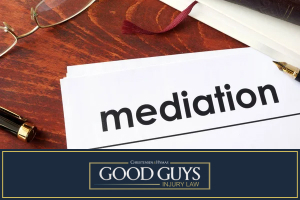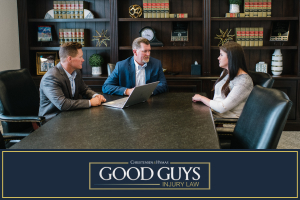
Mediation can be crucial to resolving your dispute without heading to court when you’re involved in a car accident in Utah. It’s a process where both parties sit down with a neutral third person, called a mediator, to try and reach a mutual agreement. Mediation offers a less formal, more flexible, and often quicker resolution than going to trial. Plus, it allows both sides more control over their dispute’s outcome.
At Good Guys Injury Law, we understand how helpful car accident mediators and alternative dispute resolution can be. A personal injury attorney from our law firm can negotiate with the insurance company and help you with your personal injury claim. Learn more about settlement negotiations and legal counsel below. Then, contact our personal injury lawyer to schedule a free consultation to discuss your personal injury case. Let us help you with your settlement agreement.
Table of Contents
Introduction to Mediation in Car Accident Cases
Mediation in car accident cases is a voluntary process in Utah where both parties come together to resolve their dispute with the help of a mediator. The mediator is a neutral party, often with legal or dispute resolution expertise, who facilitates the discussion but doesn’t make decisions for you. This process focuses on open communication and negotiation to reach a mutually acceptable agreement. Mediation can be a more amicable way to resolve disputes than the adversarial nature of court proceedings seen in other personal injury cases.
Mediation vs. Litigation: Understanding the Differences
Mediation and litigation are very different paths you can take after a car accident in Utah. Mediation is about cooperation; both parties work together to find a solution that satisfies everyone. It’s private and less formal; the discussions are not part of the public record. On the other hand, litigation is when you go to court, and a judge or jury decides the outcome of your case. This process is more adversarial, can be very time-consuming, and is expensive.
Litigation is often the path taken when mediation doesn’t result in a settlement or if one party believes they have a strong case that merits a court’s decision. While litigation can result in a definitive judgment awarded by the court, it removes control from the hands of the parties involved and places it with the court. Mediation, by contrast, encourages both parties to collaborate on finding a mutually beneficial solution, potentially preserving relationships and reducing future conflicts.
The Steps of the Mediation Process in Utah

The mediation process in Utah generally follows several key steps, starting with selecting a mediator. Both parties agree on who this neutral facilitator will be. Then, a meeting is set for the mediation session, where both sides will present their cases. Before this meeting, both parties prepare by gathering all relevant documents and evidence. The process is designed to be flexible, allowing for creative solutions that a court might not be able to provide.
Pre-Mediation Preparation
Both parties need to prepare extensively before the mediation session. This involves gathering all relevant documents, such as accident reports, medical records, and any correspondence related to the claim. You’ll also need to think about what you want to achieve from the mediation, set clear goals, and understand your bottom line.
Preparation also involves understanding the other side’s position and being ready to listen to their perspective. It’s helpful to anticipate their arguments and prepare counterarguments. Remember, the goal isn’t to “win” but to find a mutually acceptable solution, so being open-minded and flexible is key.
The Role of the Mediator
The mediator facilitates communication between the parties, helping them identify the issues and explore potential solutions. They ensure that the conversation remains respectful and productive. Mediators don’t make decisions for you; they guide the process and help both parties understand each other’s viewpoints.
The mediator might always offer suggestions or propose compromises to find common ground. They are skilled in negotiation techniques and can often find creative solutions that the parties might have yet to consider on their own.
Presenting Your Case
During the mediation session, each party can present their case. This includes outlining your perspective on the accident, the damages you’ve suffered, and what you believe is a fair resolution. It’s important to be clear and concise and to focus on the facts.
After presenting your case, you’ll also listen to the other side’s perspective. This is a crucial part of the process because understanding the other party’s viewpoint can help find a resolution. It’s also an opportunity to clarify misunderstandings and address the key issues that need resolution.
Negotiation and Settlement Discussions
Once both sides have presented their cases, the negotiation phase begins. This involves back-and-forth discussions, often facilitated by the mediator, to find a settlement on which both parties can agree. The mediator might suggest splitting this phase into separate sessions if it helps manage the discussions better.
During these discussions, it’s essential to remain open to compromise and consider various settlement options. The aim is to find a middle ground that addresses the needs of both parties. Sometimes, creative solutions that satisfy everyone involved lead to a successful resolution.
Benefits of Choosing Mediation for Car Accident Disputes

Choosing mediation for resolving car accident disputes offers several benefits. It’s generally faster and less expensive than going to court. Mediation sessions can be scheduled much sooner than a court date, and because the process is less formal, legal fees are often lower.
Time and Cost Efficiency
Mediation can save both time and money. The process is designed to be much quicker than litigation, with many disputes resolved in a single session. This efficiency reduces legal fees and other costs associated with drawn-out court cases.
Furthermore, the flexibility of scheduling mediation sessions means that parties can resolve their disputes without the lengthy delays often associated with the court system. This speedier resolution allows everyone to move on more quickly from the incident.
Confidentiality and Control
One key advantage of mediation is its confidentiality. Unlike public court cases, mediation sessions are private. This privacy can be crucial for parties who prefer not to air their disputes publicly.
Mediation also gives both parties more control over the outcome. Instead of a judge or jury making decisions for you, you and the other party work together to find a resolution. This control can lead to more satisfactory outcomes and can preserve relationships.
Preparing for Your Mediation Session
Preparing for your mediation session is crucial for its success. This means gathering all necessary documents, such as repair estimates, medical bills, and evidence of lost wages. These documents will support your case and help the mediator understand your position.
What Documents and Evidence You Need

To prepare effectively, you’ll need a comprehensive collection of documents related to the accident. This includes the police report, photographs of the scene and damages, medical records, and receipts for any expenses incurred.
Having a detailed record of communications with insurance companies and the other party can also be helpful. These documents provide a clear picture of the accident’s impact on your life, which is essential for mediation.
How to Present Your Case Effectively
When presenting your case, clarity and organization are key. Start by summarizing the facts of the accident and then detail your injuries and financial losses. It’s important to be honest and straightforward, focusing on the accident’s impact on your life.
Mandatory vs. Voluntary Mediation
In some cases, Utah law requires mediation before a case can go to court. This mandatory mediation reduces the court’s workload and encourages a settlement. This is mainly reserved for divorce cases and is unusual for car accident cases.
Voluntary mediation offers flexibility and allows parties to engage in the process willingly, which can lead to a more positive outcome. Whether mandatory or voluntary, understanding the role of mediation in Utah’s legal system can help you navigate your car accident dispute more effectively.
How an Attorney Can Enhance Your Mediation Outcome

An attorney can help by ensuring you fully understand your case’s legal implications and the mediation agreement. They can also assist in preparing the necessary documents and evidence, making your case as strong as possible.
Furthermore, having an attorney present during negotiations can provide security, ensuring your interests are well-represented. They can negotiate on your behalf and help you navigate the complexities of the legal system.
What Happens if Mediation Fails?
If mediation fails to result in a settlement, the next step is usually litigation. This means taking the dispute to court, where a judge or jury will decide the outcome. However, the details discussed in mediation remain confidential and cannot be used in court.
The failure of mediation doesn’t mean the end of resolving your dispute. It simply shifts the resolution to a more formal setting, where the decision is out of the parties’ hands. It’s also possible to attempt mediation again before going to court.
How Good Guys Injury Law Can Support You Through Mediation
- Expert Guidance. Good Guys Injury Law offers expert guidance on navigating the mediation process. We help you understand your rights, prepare your case, and aim for the best possible outcome.
- Preparation Assistance. Our team assists in gathering all necessary documents and evidence, ensuring you’re fully prepared for your mediation session. We focus on making your case as strong as possible.
- Negotiation Skills. With extensive experience in negotiation, our attorneys can represent your interests effectively, aiming to secure a fair and satisfactory settlement.
- Legal Advice. We provide clear, understandable legal advice at every step of the process. This ensures you make informed decisions about your case and the mediation process.
- Support and Representation. Good Guys Injury Law stands by your side from start to finish, offering support and representation. We’re committed to achieving the best outcome for you through mediation.
Contact Good Guys Injury Law for Your Utah Car Accident Lawyer

If you’re facing a car accident dispute in Utah, mediation can be a powerful tool to resolve your case efficiently and effectively. Good Guys Injury Law is here to guide you through the process, from preparation to negotiation, ensuring your rights are protected and your voice is heard.
Let our personal injury attorneys advocate for you. Contact us today to schedule a free consultation to discuss your personal injury lawsuit.